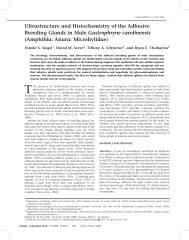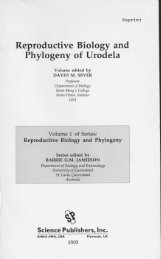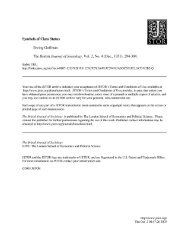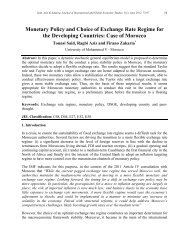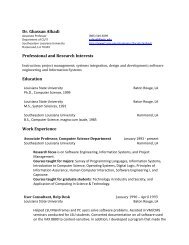Marvelous Facts and Miraculous Evidence in Early Modern Europe ...
Marvelous Facts and Miraculous Evidence in Early Modern Europe ...
Marvelous Facts and Miraculous Evidence in Early Modern Europe ...
Create successful ePaper yourself
Turn your PDF publications into a flip-book with our unique Google optimized e-Paper software.
108 Lorra<strong>in</strong>e Daston<br />
century. In general, however, the activities <strong>and</strong> autonomy of the devil<br />
decl<strong>in</strong>ed steadily <strong>in</strong> the last quarter of the seventeenth century, for reasons<br />
I shall discuss <strong>in</strong> part 5. The overall thrust of attempts to demonize<br />
preternatural phenomena was to discredit them as true signs. Counterfeit<br />
portents <strong>and</strong> false miracles pretended to a status they did not deserve,<br />
namely, that of the "signs <strong>and</strong> wonders" (Heb. 2:4) that truly announce<br />
God's will <strong>and</strong> doctr<strong>in</strong>e.<br />
While miracles became ever more closely associated with evidence,<br />
especially <strong>in</strong> the writ<strong>in</strong>gs of late seventeenth-century Protestant theologians,<br />
preternatural phenomena became ever less so. The English<br />
HebraistJohn Spencer, writ<strong>in</strong>g <strong>in</strong> 1665, condemned the belief that prodigies<br />
were portents as "a very Vulgar <strong>and</strong> Pernicious Error," endanger<strong>in</strong>g<br />
philosophy by <strong>in</strong>hibit<strong>in</strong>g the search for natural causes, corrupt<strong>in</strong>g div<strong>in</strong>ity<br />
by allow<strong>in</strong>g "a liberty for men to br<strong>in</strong>g <strong>in</strong>to it what Div<strong>in</strong>e signs they please<br />
without warrant from Scripture or reason," <strong>and</strong> underm<strong>in</strong><strong>in</strong>g the state by<br />
giv<strong>in</strong>g "every pitiful Prodigy-monger ... credit enough with the People"<br />
to ga<strong>in</strong>say authority "by tell<strong>in</strong>g them that heaven frowns upon the laws,<br />
<strong>and</strong> that God writes his displeasure aga<strong>in</strong>st them <strong>in</strong> black <strong>and</strong> visible Characters<br />
when some sad accident befals the complyers with them." Spencer<br />
did blame the devil for fobb<strong>in</strong>g off prodigies as miracles <strong>in</strong> an attempt to<br />
deceive the gullible, but he was at least as concerned about the human<br />
manipulation of such alleged signs for nefarious purposes.38 Meric<br />
Casaubon was will<strong>in</strong>g to allow for s<strong>in</strong>cere (though mistaken) claims to the<br />
power of div<strong>in</strong>ation, suggest<strong>in</strong>g that "many natural th<strong>in</strong>gs before they<br />
come to that passe, as to be generally known or visible, have some k<strong>in</strong>d of<br />
obscure beg<strong>in</strong>n<strong>in</strong>gs, by which they be known by some long before." Peo-<br />
ple or animals with unusually acute senses may <strong>in</strong>deed foretell com<strong>in</strong>g<br />
events by these "natural forego<strong>in</strong>g signes."39 Although these <strong>in</strong>dicators<br />
were <strong>in</strong> Casaubon's view genu<strong>in</strong>e signs, they were neither supernatural<br />
nor preternatural, but prosaically natural-for example, the throbb<strong>in</strong>g<br />
bunions that precede a storm.40<br />
3. From Signs to <strong>Facts</strong><br />
<strong>Facts</strong> <strong>and</strong> <strong>Evidence</strong><br />
Thus did preternatural phenomena lose their religious mean<strong>in</strong>g as<br />
signs. But they did not cease to be of <strong>in</strong>terest for learned as well as for lay<br />
audiences. Not only did vernacular collections of prodigies, now frankly<br />
advertised as "pregnant with pleasure <strong>and</strong> delight," cont<strong>in</strong>ue to spill forth<br />
38. SeeJohn Spencer, preface, A Discourse concern<strong>in</strong>g Prodigies, 2d ed. (London, 1665);<br />
see also pp. 59-60; hereafter abbreviated DCP.<br />
39. Meric Casaubon, A Treatise Concern<strong>in</strong>g Enthusiasme, As it is an Effect of Nature: but is<br />
mistaken by manyfor either Div<strong>in</strong>e Inspiration, or Diabolical Possession (London, 1655), p. 42.<br />
40. On natural div<strong>in</strong>ation, see also Ceard, La Nature et les prodiges, pp. 115ff., <strong>and</strong><br />
Thiers, Traite des superstitions qui regardent les sacrements, pp. 294-95.



